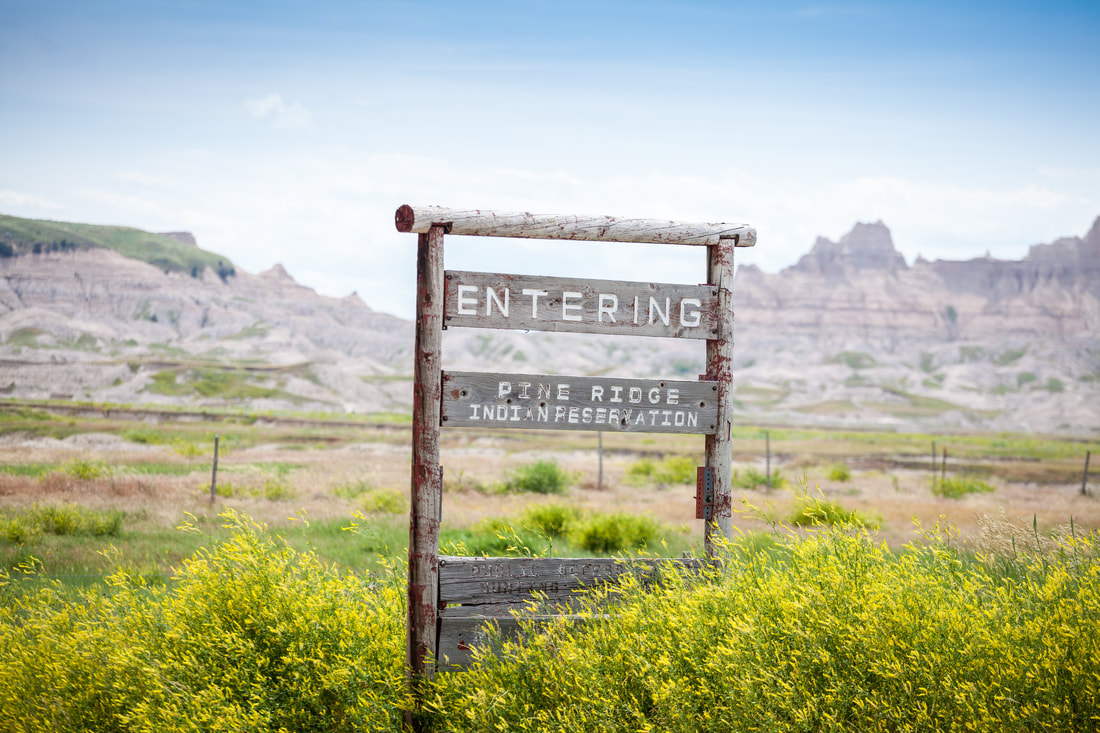|
The federal government on Thursday hit back against the Oglala Sioux Tribe's bid for extra police or funding on its South Dakota reservation, arguing that the 19th-century treaties the tribe relies on don't create a court-enforceable duty to provide a specific amount of funding or number of police. In a 38-page brief filed Thursday in South Dakota federal court, attorneys from the U.S. Department of Justice and the U.S. Department of the Interior urged the judge to dismiss the Oglala Sioux Tribe's complaint, maintaining that the tribe fails to state a claim for breach of trust, or seek any relief under the Administrative Procedures Act in its bid for more law enforcement and funding for police presence on its Pine Ridge reservation, or create new programs to protect its 40,000 members from a purported "public safety crisis." While the tribe leans on a trio of 19th-century treaties to argue that the U.S. breached its duties to provide police protection on the 3.1-million-acre Pine Ridge reservation, the federal government countered that the Oglala Sioux fail to point to any language in any of the treaties that create a judicially enforceable duty to provide a specific level of funding for police, much less at the tribe's preferred level. Furthermore, the Office of Justice Services with the Bureau of Indian Affairs properly rejected the tribe's proposals under the Indian Self-Determination and Education Assistance Act to get more funding for police and criminal investigations, considering the tribe was asking for way more funding than what's allocated for law enforcement presence on Pine Ridge, Thursday's brief states. "In an effort to forestall dismissal, plaintiff miscasts treaty language that stands in the way of its proposed interpretation and asks this court to make unreasonable inferences about what the treaties require," Thursday's brief states. "Plaintiff's opposition also improperly, and repeatedly, seeks to amend its amended complaint by asserting new factual allegations and new legal claims about the amount of funds the BIA is currently providing to plaintiff under the terms of its ISDEAA contract." Thursday's brief is the latest development in a suit the Oglala Sioux launched in July, alleging that the U.S. pays for only 41 police personnel to cover the entire reservation that is roughly the size of the state of Connecticut. That police force, consisting of just over 30 officers and eight criminal investigators, means that only six to eight people are on each shift to service the population of 40,000 members, the tribe alleged. The Oglala Sioux sought a court order last year requiring the BIA to provide emergency relief to hire more police amid a rash of violent crime on Pine Ridge. Federal treaties require the U.S. to provide such resources, and the government is breaching its obligations, the Oglala Sioux argued, adding that police response time often exceeds 30 minutes, even in circumstances involving domestic violence, firearm activity and other imminent public safety threats. The U.S. contended that tribe officials have the power to repurpose their allotment of BIA funding for police and could also seek more aid by asking agencies like the Indian Health Service to reimburse certain costs and free up existing dollars for police use. On Thursday, the U.S. maintained that the tribe's breach of trust claim fails because the U.S. has never taken exclusive control of police presence at Pine Ridge, citing a 1983 Supreme Court ruling involving the Quinault Indian Reservation, in which the high court held that a fiduciary relationship arises when the government assumes such control over Native American-owned forests and properties. But, without the Oglala Sioux's ability to show that the U.S. assumed exclusive control, there can be no showing of a trust duty, or a breach of that duty, the government argued. The tribe's ISDEAA claim based on the OJS' declinations of its proposed funding requests also fails for several reasons, the U.S. said. While the Oglala Sioux argued that the OJS didn't give a basis for deciding whether its declinations complied with federal law, the record clearly shows that the tribe wanted way more funding beyond the amount allocated for police on Pine Ridge, the U.S. argued. The agency's partial declinations were appropriate because the Oglala Sioux's proposals appeared to improperly seek an increase of approximately $3.1 million beyond the secretarial amount allocated for police on Pine Ridge, while the tribe's criminal investigations proposal seeks for an increase of $310,000 beyond the secretarial amount, the U.S. added. "Agency letters filed with plaintiff's complaint show that the agency properly explained that OST's proposals requested a budget of $9,628,345 for its Law Enforcement program and $2,211,159 for its Criminal Investigation Program, while the Secretarial amounts for the programs were, respectively, $4,026,151 and $1,327,781," the government's brief states. Nor can the Oglala Sioux obtain judicial review of the amount of money the BIA allocates for police programs on Pine Ridge, because the bureau's decision on how to allocate that money from its yearly lump sum appropriation is based on the agency's discretion, the U.S. said, adding that courts can't intervene in that allocation under the Administrative Procedures Act. Representatives for the tribe and the U.S. did not immediately return inquiries for comment Friday. The Oglala Sioux Tribe is represented by Rebecca Kidder, Patricia Marks, Ben Fenner and Conly Schulte of Peebles Kidder Bergin & Robinson LLP. The U.S. is represented by Alison Ramsdell and Aron Hogden of the U.S. Attorney's Office for the District of South Dakota, Brad P. Rosenberg, James D. Todd Jr. and Hilarie E. Snyder of the U.S. Department of Justice's Civil Division, and Femila N. Ervin, Dondrae N. Maiden, Elizabeth A. Harvey and Kristen D. Kokinos of the Interior Department's Office of the Solicitor. The case is Oglala Sioux Tribe v. United States of America et al., case number 5:22-cv-05066, in the U.S. District Court for the District of South Dakota.
0 Comments
As the 2023 legislative sessions kick off in statehouses across the country, there are bills on tap in at least four states aimed at legalizing possession and governing the use of plant- and fungus-derived psychedelic substances. In New York on Wednesday, state Rep. Linda B. Rosenthal, Democrat of Manhattan, introduced A.B. 114, which would legalize the possession of five psychedelic substances that are found in plants and fungus: psilocybin; psilocyn; dimethyltryptamine, or DMT; ibogaine; and mescaline, excluding mescaline derived from the peyote cactus. The bill includes provisions barring state and local law enforcement from assisting federal drug enforcers in going after activity protected by the legislation and provides that someone with a professional or occupational license should not have their status threatened for personal use and possession of these substances. The bill would also allow local municipalities to implement their own policies "in furtherance of this law," while protecting employees from adverse action if they use the substances on their own time and off their employers' premises. This is not the first psychedelic liberalization bill in the Empire State. In the previous session, a New York lawmaker introduced a bill to legalize the medical use of psilocybin to treat post-traumatic stress disorder, depression, alcohol dependence and anxiety, among other ailments. A.B. 8569, sponsored by state Rep. Patrick Burke, an Erie County Democrat, was referred to the Assembly Committee on Health, where it remained at the close of the 2022 session. In neighboring New Jersey, more narrowly tailored legislation has been introduced in both chambers that would decriminalize psilocybin and allow for its personal use and distribution, as well as expunge certain convictions. The Psilocybin Behavioral Health Access and Services Act, introduced in the state Assembly in December as A.B. 4911 and the Senate last summer as S.B. 2934, would develop a regulatory scheme for the Department of Health to administer psilocybin treatment centers to patients age 21 and over. The bills prescribe an 18-month development program for the new regulations, during which a governor-appointed 12-person board would advise regulators on best practices and how to balance public health and safety concerns, and expressly forbid any county or municipality from levying taxes or fees on the manufacture or sale of psilocybin or the provision of psilocybin services. Meanwhile, in California, a state senator is taking a second shot at a piece of legislation that would decriminalize possession and personal use of certain psychedelic drugs. Scott Wiener, D-San Francisco, told Law360 in December that he is "cautiously optimistic" about passage of the bill, which would allow for statewide individual use of a number of drugs that have the potential to treat an array of disorders, but particularly those related to mental health and substance abuse. The lawmaker said that psychedelics provide "some of the most promising treatments we have for PTSD, anxiety, depression and addiction." The reintroduced bill, S.B. 58 would allow for the personal possession of five psychedelic substances: psilocybin, psilocyn, DMT, ibogaine and mescaline. As with the New York bill, mescaline derived from peyote would not be legalized for general adult use under the law. Peyote-derived mescaline is considered a sacrament in some Native American religious ceremonies. Indigenous activists have lobbied the psychedelic legalization movement and nascent psychedelic industry to establish guardrails that would preserve Indigenous access to the plant against a wave of new interests. The legislation would legalize possession of up to four grams of the substances by persons age 21 or older. The bill would also create new civil and criminal penalties for giving psychedelics to underage people. A previous version of the bill passed the state Senate in June 2021, but stalled in the state Assembly, moving to the chamber's inactive file in August 2022. "The bill came very close to passing last year," Wiener told Law360. "We were cautiously optimistic. What tripped it up was the chair just gutted the bill and made it not worth passing. We are trying again." Finally, in Montana, Democratic state Sen. Jill Cohenour has initiated the drafting process for a bill to legalize psilocybin for treatment of PTSD and other mental illnesses. The request for a draft was submitted on Nov. 15 to the state Legislative Services Division's Office of Research and Policy Analysis, and there is not currently any text available for the bill. "I'm hoping to be able to change the culture around using psilocybin under controlled circumstances, inpatient, for the treatment of PTSD and other illnesses that show promise," Cohenour told Law360. "Some success has been shown in this treatment, and I believe anything that we can use to treat devastating mental illnesses that often result in suicide should be available to the medical system in Montana."
A legally blind woman on Tuesday sued the first regulated cannabis dispensary in New York in federal court, saying its website violates the Americans with Disabilities Act because it is not accessible to the visually impaired and the blind. In the complaint, Rasheta Bunting said she has attempted to purchase cannabis products from the website of Housing Works Cannabis LLC, which runs a shop on Broadway, but has been unable to because it lacks website features and compatibility with programs that allow the visually impaired to navigate websites and make purchases. Bunting says in the complaint that she is legally blind and an advocate for the rights of people with disabilities, and is a "tester" of whether facilities and websites are properly accessible to people with disabilities. People with visual impairments use text readers, keyboard shortcuts and other tools that can read aloud descriptions from websites, and Housing Works' website is designed such that it is not compatible with these tools and common practices, according to the complaint. Bunting also noted that the blind have even more need to be able to shop online, giving the difficulties of traveling to a physical location, and despite readily available accessibility technology, Housing Works' site relies exclusively on a visual interface that requires a mouse to navigate. According to the complaint, graphics on the site lack alt text that screen-reading software uses to describe those images to the blind, links are not adequately labeled and drop-down menus are not designed to be accessible. The site also lacks prompting information that lets blind shoppers locate and accurately fill out online forms, such as for credit card and other information, meaning visually impaired customers cannot make purchases without assistance. When attempting to shop on the site, Bunting said she did not receive verbal notification when an item was added to her cart, could not close the shopping cart window, couldn't access the search option and did not receive error notifications that would let her correct mistakes in the form. She also said she likes the wide selection of products offered on the site and intends in the future to try the products, if she could navigate the website. In the complaint, Bunting aims to represent a class of legally blind persons in the U.S., and a subclass in New York, who attempted to use Housing Works' website but were denied access because its design does not account for the visually impaired. The complaint alleges violations of the ADA as well as New York's Human Rights Law and Civil Rights Law, and seeks an order forcing Housing Works to make its website accessible, as well as compensatory damages. Representatives for Bunting and Housing Works could not immediately be reached for comment Tuesday. Bunting is represented by Dan Shaked of Shaked Law Group PC. Counsel information for Housing Works was not immediately available Tuesday. The case is Bunting v. Housing Works Cannabis LLC, case number 1:23-cv-00286, in the U.S. District Court for the Eastern District of New York.
The U.S. Court of Appeals for the Fifth Circuit struck down the federal agency ban on bump stocks, claiming only Congress may ban the device used by a mass murderer in Las Vegas. The en banc decision reverses a Fifth Circuit panel decision that favored the Bureau of Alcohol, Tobacco, Firearms and Explosives—and creates a split with the Sixth Circuit in Cincinnati, the Tenth Circuit in Denver and the D.C. Circuit in Washington, D.C. Dissent The opinion was not unanimous, with one circuit judge writing a dissent that was joined by two other judges. Circuit Judge Stephen A. Higginson’s dissent argued the bump stock is a machine gun within the meaning of the federal statute. “The Supreme Court lets us deploy lenity to narrow laws only as a last resort when, having tried to make sense of a statute using every other tool, we face an unbreakable tie between different interpretations. Contrary to this authority, the majority opinion and the lead concurrence apply the rule of lenity to garden-variety ambiguity,” Higginson said. “In doing so, today’s ruling usurps Congress’s power to define what conduct is subject to criminal sanction and creates grave ambiguity about the scope of federal criminal law,” Higginson said. What Is a Machine Gun? The legal team behind the federal regulation challenge, Michael Cargill v. Merrick B. Garland, was New Civil Liberties Alliance. NCLA argued that the Final Rule conflicts with the statutory definition of a machine gun, and therefore exceeds Bureau of Alcohol, Tobacco, Firearms and Explosives’ authority; the ATFE’s legal interpretation is not entitled to executive agency deference; to the extent courts determine the definition of machine gun is ambiguous, they should apply the rule of lenity to determine that bump stocks are not machine guns; and if the statute were interpreted as authorizing an ATFE prohibition, then the statute would be an unconstitutional delegation of Congress’s legislative powers. Writing for the majority, Judge Jennifer Walker Elrod stated, “In defining the term machine gun, Congress referred to the mechanism by which the gun’s trigger causes bullets to be fired. Policy judgments aside, we are bound to apply that mechanical definition. And applying that definition to a semi-automatic rifle equipped with a non-mechanical bump stock, we conclude that such a weapon is not a machine gun.” NCLA president and general counsel Mark Chenoweth, in a prepared statement, said, “The resulting circuit split should bring this decision to the U.S. Supreme Court’s attention promptly, and supply a suitable vehicle for deciding this issue once and for all.” Change in Direction The Bureau of Alcohol, Tobacco, Firearms and Explosives’ defense was substantially weakened by the fact that for a decade it claimed that bump stocks on semiautomatic weapons did not meet the mechanical definition of a machine gun. It only changed its position after the 2017 mass shooting in Las Vegas where a lone gunman used the guns to kill 58 people and wound hundreds more. Circuit Judge James C. Ho wrote a concurrence, joined by two circuit judges, in which he acknowledged that bump stocks have the effect of allowing semiautomatic weapons to mimic automatic machine guns. Ho suggested that Congress follow the path it took with designer drugs that, during the 1980s, were constantly being chemically redesigned to get around federal controlled substance laws. “Congress could not ban designer drugs without passing the Analogue Act,” Ho said. “Likewise, Congress cannot criminalize bump stocks absent a clear and unambiguous statute.” Responding to Ho’s example, Higginson argued that would not work, either, since, “Under our court’s new lenity regime, it is unclear how Congress could draft such a statute while avoiding ambiguity as to what counts as a bump stock.” In fact, Higginson wrote, after the court’s en banc ruling, it isn’t clear the Controlled Substance Analogue Enforcement Act of 1986 is now operable in practice since it also depends on a “substantially similar” to a controlled substance chemical definition. “They are now suffering and will continue to suffer grave, immediate, and ongoing injuries to the exercise of their faith" The U.S. Court of Appeals for the D.C. Circuit ruled that Sikh Marine recruits don’t have to shave their religious beards during basic training. Judges Neomi Rao, Patricia Millett and J. Michelle Childs halted a Marine policy barring religious beards during training from being applied against two Sikh recruits who challenged the military branch’s rules earlier this year, saying it likely burdens the exercise of their faith. The judges, in an opinion Dec. 23, said the Marines’ stated national security interest in barring religious beards was too broad, and noted the military branch already makes exemptions for medical beards, women’s hairstyles and tattoos. The Marine Corps had argued the policy is needed to train recruits to strip away their individuality and adopt a team mentality. “The Corps has not shown, in light of its preexisting exemptions to the grooming process … that denying these accommodations would have any impact on its claimed interests,” Millett wrote. “They are now suffering and will continue to suffer grave, immediate, and ongoing injuries to the exercise of their faith.” The judges also said preliminary injunctions would promote Congress’ and presidents’ goal of promoting religious diversity in the military, under the Religious Freedom Restoration Act passed in 1993 and past statements. The panel reversed a preliminary injunction against two of the plaintiffs, Milaap Chahal and Jaskirat Singh, allowing them to begin serving in the Marines with their beards. They ordered U.S. District Judge Richard Leon to reconsider the injunction against a third recruit, Akesh Singh, who may have postponed his enlistment. The lawsuit was filed by Winston & Strawn, Baker & Hostetler, the Sikh Coalition and the Becket Fund in April. “Today’s injunction is a step forward in the direction of other recent policy changes in the U.S. Army and U.S. Air Force that have allowed more than 100 Sikhs to serve with their articles of faith,” Amandeep S. Sidhu, partner at Winston & Strawn, said in a statement. “Now, we must look towards a comprehensive policy change in the U.S. Marine Corps that will make full equality of opportunity in that branch a reality for all Americans, regardless of their faith tradition.” A California judge granted a restaurant industry coalition's eleventh-hour bid to pause the state's landmark law raising wages and labor standards in the fast-food industry ahead of its Jan. 1 effective date, preserving the status quo as she considers the group's suit challenging the law. On Dec. 30, Sacramento County Superior Court Judge Shelleyanne W.L. Chang agreed to temporarily halt the enforcement of Assembly Bill 257, also known as the Fast Food Accountability and Standards Recovery Act, which was signed into law by Gov. Gavin Newsom on Sept. 6, 2022. A coalition consisting of restaurant trade associations and small businesses called Save Local Restaurants on Dec. 29 sued the California Department of Industrial Relations director Katrina Hagen, Secretary of State Shirley Weber and Attorney General Rob Bonta, all in their official capacities, arguing in its petition for writ of mandate and complaint for declaratory and injunctive relief that A.B. 257 cannot go into effect until California voters had a chance to vote on the legislation through the referendum process. Provisions of the statute include allowing a government-selected council of workers, union representatives and employers to set minimum wages and working conditions for the fast-food industry across California. Judge Chang set a hearing date for Jan. 13 on the petitioners' bid for a preliminary injunction. According to Save Local Restaurants, the coalition far surpassed the required number of signatures it was required to gather for its referendum petition challenging A.B. 257 by the early December deadline, gathering approximately 1,004,429 signatures to qualify for the ballot. However, on Dec. 27, Department of Industrial Relations director Hagen sent a letter to the coalition's counsel, noting that the law would be paused if, and when the referendum qualifies for the ballot, and that the process for verifying signatures is underway. But, without clear authority providing that the law is suspended "merely upon submission of unverified signatures, DIR has an obligation to proceed with implementing the duly enacted statute," Hagen's letter states. Save Local Restaurants contended that Hagen's position runs afoul of century-old precedent that protects the fundamental right of voters to prevent a law from going into effect unless and until it is approved at a statewide election. A.B. 257's provisions, which includes creating a Fast-Food Council that would have the authority to enact standards regulating the fast-food industry starting Jan. 1, would result in the unconstitutional enforcement of a law that California's voters already decided to challenge through the referendum process, the coalition argued, adding that temporarily allowing the implementation of the law "also would create confusion and set a dangerous and absurd precedent." If the court doesn't step in, the petitioners and California's voters "will be threatened with the unconstitutional scenario where AB 257 goes into effect for a few to several weeks, only then to be suspended once elections official complete their administrative tasks of certifying the petition," Save Local Restaurants said. Save Local Restaurant's bid to halt A.B. 257 comes just weeks after it announced on Dec. 5 that it collected enough signatures to repeal the monumental Golden State labor law that the group alleges would have "damaging impacts" on small and minority-owned businesses. After Gov. Newsom signed A.B. 257 into law on Labor Day, opponents promptly initiated a voter referendum that, if successful, would repeal the law. The first step to qualify for the referendum was gathering more than 600,000 signatures by early December. A.B. 257 came as a momentous victory for union organizers who have worked with fast-food employees for years to have more say on safety, pay and training. It has been championed by labor organizations, including the Service Employees International Union of California and Fight for $15, that say A.B. 257 gives fast-food workers a much-needed voice in determining working conditions. Under the law, the government-appointed body can hike the pay floor for workers as high as $22 an hour in 2023. In January 2024, the council could then raise the hourly minimum wage by no more than 3.5%, or a figure pegged to the U.S. consumer price index. In a statement last week following Judge Chang's order temporarily pausing A.B. 257, Save Local Restaurants said that the court's decision protects the voices of more than a million California voters who want to have their say on the law. "This process has been preserved for more than 100 years and was in grave risk of being suppressed," the coalition's statement reads. "While this pause is temporary, the impact is beyond just one piece of legislation and keeps intact for the time being California's century-old referendum process." Erin Mellon, a spokesperson for the governor, touted the act as giving "fast-food workers a seat at the table to set fair wages and important health and safety standards. Although industry is backing a referendum measure, the Secretary of State has not certified that it has enough signatures to qualify for the ballot. The State has an obligation to implement this important law unless and until that occurs. We will, of course, abide by any court order." Joe Kocurek, spokesperson for the California secretary of state, told Law360 in an email that the agency will not be offering comment, "as it's a pending legal matter." A spokesperson for the state attorney general's office directed all inquiries to the California Department of Industrial Relations. Save Local Restaurants is represented by Sean P. Welch, David J. Lazarus, and Kurt R. Oneto of Nielsen Merksamer Parrinello Gross & Leoni LLP. Counsel information for the state agencies was not immediately available Tuesday. The case is Save Local Restaurants et al. v. Katie Hagen et al., case number 34-2022-80004062, in the Superior Court of the State of California, County of Sacramento.
A New York Native American tribe has condemned Gov. Kathy Hochul's veto of a bill protecting unmarked burial sites, saying the move demonstrates "a continued bias against Native American communities in New York."
Just a handful of states have yet to enact laws protecting Indigenous peoples' remains from "desecration and destruction," the Shinnecock Council of Trustees said in a Friday statement to Law360, adding that Hochul "is the only person standing in the way of New York joining" the majority of states that have enacted such legislation. The federally recognized Shinnecock Indian Nation's reservation is located in Southampton. "The Unmarked Burial Site Protection Act had overwhelming support in both the State Assembly and State Senate, but Governor Hochul vetoed the bill after unjustified and unpalatable amendments to the bill were rejected," the council said, adding that Hochul last month also vetoed legislation for the state recognition of Montaukett Indians. Hochul vetoed the Unmarked Burial Site Protection Act on Dec. 30, reasoning that, to be enacted, the legislation would need to better protect both the property owners and descendants involved. The legislation laid out a process for handling newly discovered burial sites, including prohibiting the disturbance of sites discovered during development. From there, the bill proposed that the burial site be reported to the local coroner and, for remains older than 50 years, a state-appointed archeologist, who would be charged with determining whether the remains are of Native American origin. The bill proposed creating a Native American burial site review committee, which would adopt a standard plan for determining the descendants and cultural groups of those buried. The bill passed the state Senate in May nearly unanimously. But the executive office could not reach an agreement with state lawmakers that "would balance the rights of property owners with the interests of families of lineal descendants and other groups," Hochul said in the veto message, which was provided to Law360 by a spokesperson for state Sen. Leroy Comrie, who sponsored the bill. "I recognize the need for a process to address the handling of unearthed human remains in a way that is respectful to lineal descendants or culturally affiliated groups," Hochul said. "However, any process addressing the handling of unearthed human remains that also involves the private property of New Yorkers must appropriately protect both interests." Hundreds of accounts belonging to the U.S. Department of the Interior used weak passwords like "Password-1234," exposing the agency to potential hacks from even the most low-skilled of attackers, an agency watchdog said Friday. During its investigation, the agency's Office of Inspector General said it was able to compromise 18,174 of 85,944 — or 21% — of the department's active accounts, including 362 accounts of senior U.S. government employees and 288 accounts with "elevated privileges," like system administrators. The watchdog report revealed how the Interior Department, whose responsibilities include environmental conservation efforts, managing public lands and minerals, and providing services to American Indian tribes and Alaska Natives, made several basic cybersecurity errors, including that 4.75% of all active user account passwords were based on the word "password." The department also has outdated password complexity requirements that have allowed users to select easy-to-crack passwords like "Changeme$12345," "Polar_bear65" and "Nationalparks2014!," the inspector general's office said. The most commonly used password at the agency, "Password-1234," was used on 478 accounts and "currently meets the department's requirements even though it is not difficult to crack," the watchdog added. The department also failed to implement multifactor authentication, another basic cybersecurity practice, for 89% of what the inspector general's office called "high-value assets" that could "have serious impacts to the department's ability to conduct business if compromised," the report said. "We found that the department's management practices and password complexity requirements were not sufficient to prevent potential unauthorized access to its systems and data," according to the watchdog's investigators. The watchdog warned that the agency risks a potentially widespread cyberattack on its network if it does not take steps to address its cybersecurity failings, including by bolstering its password complexity requirements. "If a malicious actor compromises an account with elevated privileges, such as the account of a system administrator, the magnitude of harm increases as the attacker can upload malware, steal sensitive data, add or delete users, change system configurations, and alter logs to conceal his or her actions," the inspector general's office wrote. U.S. federal agencies have been targeted several times in cyberattacks in recent years, including in a sprawling 2020 incident, attributed to Russian spies, that breached the networks of at least nine federal government agencies and hundreds of private companies. A press representative for the Interior Department declined to comment Friday on the watchdog's findings. Louisiana residents have settled a lawsuit they brought against a group of law firms, lawyers and insurance companies over missed relief money following the 2010 BP Deepwater Horizon oil spill, a Louisiana federal judge said in an order Friday dismissing the case. U.S. District Judge Wendy B. Vitter entered a conditional order of dismissal, effectively ending a suit brought in the summer of 2020 by Louisiana fishing professionals who alleged that the missteps of attorneys caused them to miss out on relief money that was handed out following the oil spill. Judge Vitter said the sides told a federal magistrate judge in a settlement conference on Wednesday that they'd agreed to settle all claims in the matter. The case is now conditionally dismissed without prejudice as the sides work to enforce the settlement agreement. "The court is aware of the great time and effort put forth by the parties, and the magistrate judge, over the holidays to achieve this amicable resolution, and thanks them for their diligence," Friday's order read. In a suit that was originally filed in Louisiana state court in July 2020 and removed to federal court in November of that year, plaintiffs led by Brandon Henry alleged that several law firms rushed through settlement requests before a June 2015 filing deadline to obtain oil spill relief. They also alleged that the relief claims were falsely inflated to increase attorney fees. The plaintiffs, Louisiana residents who worked in fishing-based occupations, said those exaggerated figures led to them being denied compensation. The residents sued the firms and attorneys for fraud and malpractice. The firms and lawyers named in the suit are the Howard L. Nations Law Firm, Howard Nations, Cindy Nations, Rueb Law Firm APLC, Rueb & Motta APLC, Gregory Rueb, Nicks Law Firm LLC and Shantrell Nicks. In March, Judge Vitter tossed the fraud claims, but allowed the residents to continue with their claims for malpractice. Regarding the fraud accusations, the district court judge found that the residents didn't put forward specific enough evidence to show that the firms and attorneys intended to mislead their clients. In allowing the malpractice accusations to move forward, Judge Vitter rejected the attorneys' argument that the residents' claims should be barred by a statute of limitations. The judge affirmed that decision in April, and earlier this month rejected new arguments the attorneys put forth again seeking an order that the malpractice claims should be time-barred. Henry and the other plaintiffs also sued their former lawyers' professional liability insurers: Landmark American Insurance Co., Capitol Specialty Insurance Corp., Maxum Indemnity Co., QBE Insurance Corp. and Allied World Surplus Lines Insurance Co. The plaintiffs argued that the insurers are on the hook for the misconduct alleged against the firms and sought recovery under the policies. In November, Judge Vitter granted motions for summary judgment filed by Capitol Specialty and Landmark, dismissing those insurers from the case. Maxum and QBE lost their bids to exit the litigation. The residents voluntarily dismissed Allied World from the case in December 2020. Representatives of the parties didn't immediately respond to requests for comment Friday. The plaintiffs are represented by Jerald P. Block, Sarah M. Lambert and Matthew P. Hymel of Block Law Firm APLC. Howard L. Nations APC, Howard Nations, Cindy Nations, the Rueb Law Firm APLC, Rueb & Motta APLC and Gregory Rueb are represented by Judy Lynn Burnthorn, Joanne P. Rinardo and Gregory J. Sauzer of Deutsch Kerrigan LLP. Howard L. Nations APC, Howard Nations and Cindy Nations are also represented by Alexandre E. Bonin of Bonin Law. Joseph Motta and his law firm are represented by Brian J. Capitelli and Tyffani A. Lauve of Capitelli & Wicker. Shantrell Nicks and her law firm are represented by Tamekia R. Goliday of Goliday Law Firm. QBE is represented by Robert I. Siegel and Alistair M. Ward of Gieger Laborde & Laperouse LLC. Maxum is represented by Seth A. Schmeeckle, Heather N. Sharp and Jay P. Farmer of Lugenbuhl Wheaton Peck Rankin & Hubbard. The case is Henry et al. v. Maxum Indemnity Co. et al., case number 2:20-cv-02995, in the U.S. District Court for the Eastern District of Louisiana. The Biden administration on Friday published new guidance for federal agencies that are assessing the greenhouse gas and climate change effects of actions such as approving infrastructure projects. Under the new interim guidance, the White House Council on Environmental Quality said federal agencies carrying out National Environmental Policy Act reviews of proposed projects are getting clearer instructions on how to handle a number of issues, from how detailed of an analysis to undertake to how to better interact with communities. The guidance replaces Obama-era guidance that had been rescinded by the Trump administration. "Disclosing and reducing emissions will ensure we're building sustainable, resilient infrastructure for the 21st century and beyond," CEQ Chair Brenda Mallory said in a statement on Friday. "These updated guidelines will provide greater certainty and predictability for green infrastructure projects, help grow our clean energy economy, and help fulfill President Biden's climate and infrastructure goals." The interim guidance, which the CEQ said would be finalized after public comments are collected, includes a "rule of reason" standard for greenhouse gas reviews that tells agencies that the depth of their analysis "should be proportional to a project's impacts," meaning projects that will reduce greenhouse gas emissions, such as certain renewable and low-greenhouse gas projects, can have a less-detailed analysis, according to the council. In 2020, the Trump administration released draft guidance that would have required agencies to assess greenhouse gas effects only "when a sufficiently close causal relationship exists between the proposed action and the effect" and that a "'but for' causal relationship is not sufficient." In February 2021, the CEQ withdrew the Trump administration's draft and started work on a new version. Under the new guidance, the CEQ clarified the best practices for analyzing climate change effects, which include quantifying indirect emissions. The guidance also recommends best practices for communicating and providing context for climate impacts, "such as by noting relevant climate action commitments and goals and using the social cost of [greenhouse gases] to generate monetary estimates of climate impacts," the CEQ said. Agencies are also encouraged to mitigate greenhouse gas emissions to the greatest extent possible, "meaningfully engage" with communities and incorporate environmental justice considerations into climate-related analysis. The guidance will likely be welcomed by the Federal Energy Regulatory Commission, whose evaluation of the greenhouse gas impacts of pipeline projects that it approves has been the subject of much debate. FERC in the past has said it can't determine the significance of greenhouse gas impacts of projects it approves, so that's where the CEQ guidance may help. Sierra Club Legislative Director Melinda Pierce praised the CEQ's proposal for clarifying best practices, streamlining some renewable energy project reviews and requiring agencies to engage more with communities. "The Biden administration's actions today build upon their continued efforts to restore scientific integrity and clarity to [National Environmental Policy Act] regulations, and we look forward to receiving further guidance that strengthens our bedrock environmental laws, incorporates climate impacts into decision-making, and protects communities," Pierce said. |
HISTORY
April 2024
Categories |
© Walk 4 Change. All rights reserved.












 RSS Feed
RSS Feed